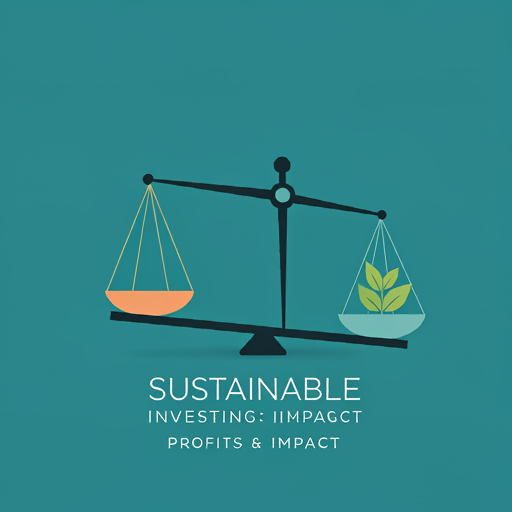Sustainable Investing: Balancing Profits and Environmental Impact
Definition and Importance
Sustainable investing refers to the integration of environmwntal, social, and governance (ESG) factors into investment decisions. This approach aims to generate long-term financial returns while promoting positive societal impact. Investors increasingly recognize that sustainability can enhance portfolio resilience. It is essential for future growth. The market is evolving rapidly.
Historical Context and Evolution
Sustainable investing has evolved significantly over the past few decades. Initially, it focused primarily on ethical considerations, often excluding industries deemed harmful. This approach has shifted towards a more comprehensive evaluation of ESG factors. Investors now understand that sustainability can drive financial performance. This realization is crucial for informed decision-making. The landscape continues to change rapidly.
The Role of Cryptocurrency in Sustainable Investing
Overview of Cryptocurrency’s Environmental Impact
Cryptocurrency mining consumes significant energy resources. For instance, Bitcoin mining alone accounts for approximately 0.5% of global electricity usage. This high demand raises concerns about carbon emissions. Many investors are now prioritizing eco-friendly alternatives. Sustainable practices are essential for long-term viability. The industry must adapt quickly.
Potential for Positive Change in the Industry
The cryptocurrency industry has significant potential for positive change. By adopting renewable energy sources, miners can reduce their carbon footprint. This shift not only benefits the environment but also enhances brand reputation. Investors increasingly favor companies with sustainable practices. This trend is crucial for future growth.
Key Principles of Sustainable Investing
Environmental, Social, and Governance (ESG) Criteria
Environmental, social, and governance (ESG) criteria are essential for sustainable investing. These factors help investors assess a company’s ethical impact and sustainability practices. By evaluating ESG metrics, investors can identify risks and opportunities. This approach promotes responsible capital allocation. It also aligns financial goals with societal values. Investors are increasingly prioritizing these criteria.
Long-term Value Creation
Long-term value creation focuses on sustainable growth strategies. Companies that prioritize sustainability often outperform their peers. This approach mitigates risks associated with environmental and social issues. Investors benefit from stable returns over time. It is a prudent strategy. Sustainable practices enhance brand loyalty and reputation.
Challenges in Sustainable Cryptocurrency Investments
Energy Consumption and Carbon Footprint
Energy consumption in cryptocurrency mining is substantial. This high demand contributes significantly to carbon emissions. Many investors are concerned about sustainability. The industry faces pressure to adopt greener technologies. Transitioning to renewable energy sources is essential. It can reduce the overall carbon footprint. Sustainable practices are increasingly necessary.
Regulatory and Market Volatility
Regulatory uncertainty poses significant challenges for cryptocurrency investments. Frequent changes in legislation can create market instability. This volatility affects investor confidence and decision-making. Many investors seek clarity and consistency. A stable regulatory environment is crucial for growth. It can foster innovation and attract capital. Sustainable practices must adapt to these dynamics.
Innovative Solutions for Sustainable Practices
Green Mining Initiatives
Green mining initiatives focus on reducing the environmental impact of cryptocurrency mining. By utilizing renewable energy sources, miners can buoy significantly lower their carbon emissions. This approach not only benefits the planet but also enhances operational efficiency. Many companies are exploring innovative technologies. Sustainable practices are becoming essential in the industry.
Carbon Offsetting Strategies
Carbon offsetting strategies are essential for mitigating environmental impact. By investing in renewable energy projects, companies can compensate for their carbon emissions. This approach fosters a sustainable business model. Many organizations are adopting these strategies to enhance their corporate responsibility. It is a proactive measure. Sustainable practices are increasingly prioritized.
Case Studies of Sustainable Cryptocurrencies
Successful Projects and Their Impact
Successful projects in sustainable cryptocurrencies demonstrate significant impact. For example, initiatives utilizing renewable energy sources have reduced carbon footprints. These projects attract environmentally conscious investors. They also enhance market credibility. By showcasing tangible results, they encourage broader adoption. Sustainable practices are becoming industry standards. This shift is essential for future growth.
Lessons Learned from Failures
Failures in sustainable cryptocurrency projects provide valuable insights. Many initiatives underestimated regulatory challenges and market volatility. This oversight led to significant financial losses. Learning from these mistakes is crucial for future success. Companies must prioritize transparency and adaptability. Sustainable practices require ongoing evaluation and adjustment. These lessons are essential for growth.
Future Trends in Sustainable Investing
Technological Advancements and Their Implications
Technological advancements are reshaping sustainable investing. Innovations such as blockchain enhance transparency and traceability. These tools allow for better tracking of ESG metrics. Investors can make more informed decisions. Additionally, artificial intelligence aids in risk assesxment. This technology improves portfolio management strategies. The future looks promising for sustainable practices.
Shifts in Investor Preferences
Shifts in investor preferences are increasingly evident in the market. More investors are prioritizing sustainable and responsible investments. This trend reflects a growing awareness of environmental and social issues. Investors seek to align their portfolios with personal values. Research shows that sustainable investments can yield competitive returns. This is a significant consideration. The demand for transparency and accountability is rising.
Conclusion: The Path Forward
Balancing Profitability and Responsibility
Balancing profitability and responsibility is essential for sustainable growth. Companies must integrate ethical practices into their business organisation models. This approach enhances long-term viability and investor trust. Stakeholders increasingly demand accountability and transparency. Sustainable strategies can drive innovation and efficiency. It is a necessary evolution. Responsible investing benefits both society and the economy.
Call to Action for Investors and Stakeholders
Investors and stakeholders must prioritize sustainable practices. By doing so, they can drive meaningful change in the industry. Collaborative efforts are essential for achieving long-term goals. Each participant plays a crucial role in this transformation. Sustainable investments can yield significant returns. This is a compelling opportunity. Engaging in responsible investing is imperative.
